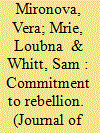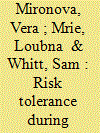|
|
|
Sort Order |
|
|
|
Items / Page
|
|
|
|
|
|
|
| Srl | Item |
| 1 |
ID:
172335


|
|
|
|
|
| Summary/Abstract |
What sustains commitment to rebel fighting during civil war? Using original survey data from the ongoing conflict in Syria, we examine whether self-ascribed rebel fighters, former fighters, civilians, and refugees can be clearly differentiated based on commitment to rebellion. We ask whether such groups are better characterized as a broadly holistic fighting community or a heterogeneous mix of actors with different levels of support for violence. Using a well-balanced sample of over 300 active and former rebel fighters, civilians from within the conflict zone, and externally displaced refugees, we observe that fighting commitment is greater among active combatants compared to other cohorts. To understand why, we examine underexplored psychological mechanisms and find that individuals with higher risk tolerance, optimism bias, and identity fusion with rebel forces display greater dedication to fighting. We discuss the implications of our results for understanding who participates in civil war violence and why.
|
|
|
|
|
|
|
|
|
|
|
|
|
|
|
|
| 2 |
ID:
168998


|
|
|
|
|
| Summary/Abstract |
When war breaks out, how important are risk preferences to explaining why some individuals stay in conflict zones while others take flight? We examine risk tolerance among rebel combatants and civilians in Aleppo, Syria using a variation of the Eckel-Grossman Choice Game. Field work in Syria was conducted in 2013–14 with a total of 232 participants to include both Syrian civilians and active rebel fighters in Aleppo and Idlib Province, as well as among Syrian refugees in neighboring Turkey. Compared to Syrians in other locations, people in rebel-held territory of Aleppo, both combatants and non-combatants, are significantly more risk tolerant. We consider possible explanations for elevated risk preferences in Aleppo based on self-selection, adaptive learning, a sense of self-efficacy to affect future outcomes, conflict-related grievances, and in-group solidarity. Our analysis suggests that self-selection based on access to resources and a strong sense of self-efficacy may explain higher propensity for risk-taking. Overall, our results speak to a plausible sorting mechanism during conflict where risk averse individuals select out of conflict, while highly risk tolerant individuals are more prone to discount the inherent dangers of remaining in conflict zones. Our results provide new micro-level explanation for why some societies become mired in conflict traps involving highly risk tolerant fighting communities.
|
|
|
|
|
|
|
|
|
|
|
|
|
|
|
|
|
|
|
|
|